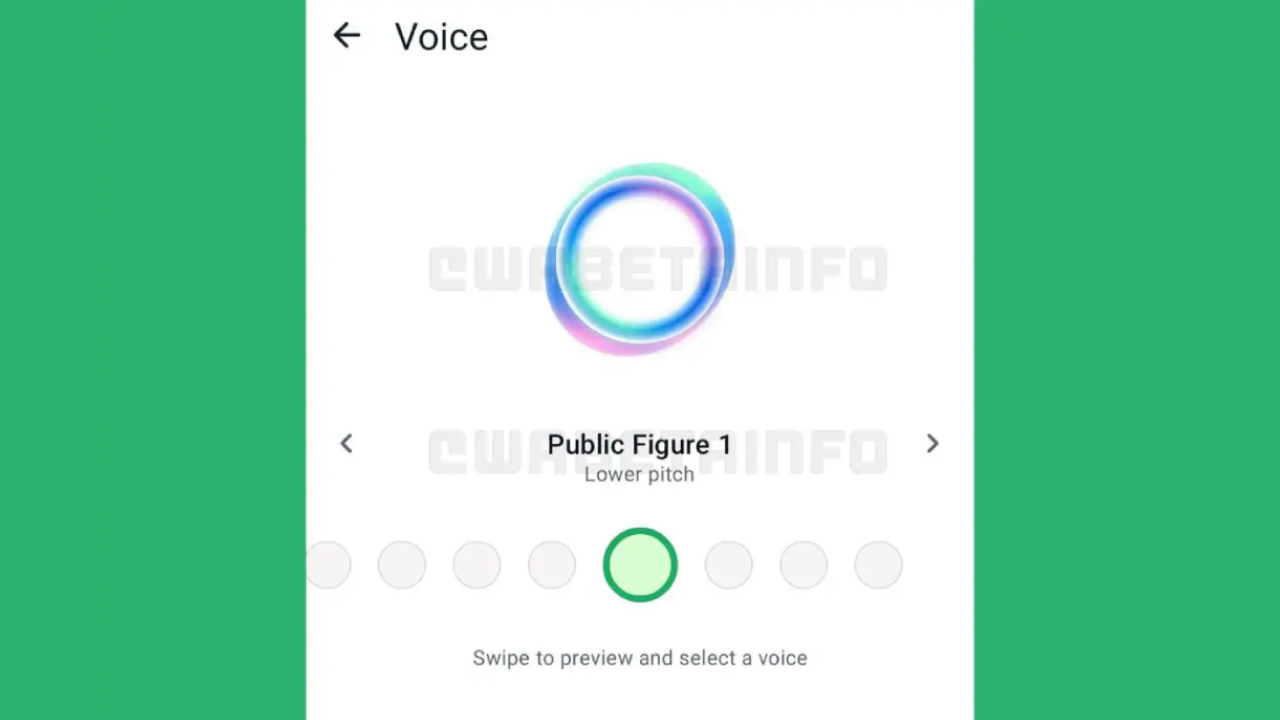Meta, the parent company of WhatsApp, is poised to revolutionize how users interact with artificial intelligence on the platform.
WhatsApp for Android is reportedly preparing to roll out a two-way voice chat feature, enhancing its Meta AI chatbot with a selection of voices modeled after public figures. This exciting update is expected to allow users to customize their conversations with Meta AI, giving them the chance to select from voices of notable personalities.
Table of Contents
A Leap Toward Human-Like AI Interactions
Meta has consistently pushed boundaries with AI advancements, and this latest development is no exception. The voice mode feature, soon to be introduced in WhatsApp’s Android version, marks a significant step toward making AI interactions more personalized and human-like. Users will not only be able to converse with Meta AI but also select how they want the AI to sound, choosing from voices that differ in pitch, tonality, and accents. According to reports, the feature will include voices from the US and the UK, making the experience more versatile and culturally attuned.
The standout feature, however, is the ability to select voices of public figures. Although specific names have yet to be revealed, the prospect of conversing with an AI chatbot that mimics a famous personality is a bold move. This follows Meta’s earlier endeavors, where they introduced custom AI chatbots on Messenger, modeled after influencers and celebrities.
The Impact of Voice Technology on User Experience
Voice technology in AI chatbots is not entirely new. Various platforms, such as ChatGPT, have already integrated voice modes to provide a more interactive and engaging experience for users. Meta’s introduction of voice customization, especially with voices from public figures, could significantly elevate the way users interact with the WhatsApp platform.
Users who prefer to engage with AI through voice chat rather than text will benefit from the wide array of voice options. With the option to choose voices that reflect different accents, tones, and personalities, users can tailor their interactions based on personal preferences. The presence of public figure voices adds an exciting layer to the experience. For example, a user could have a conversation with an AI chatbot that sounds like their favorite celebrity, making the interaction more entertaining and relatable.

Moreover, voice technology makes the AI appear more natural and human-like, fostering deeper connections between users and the chatbot. By integrating a range of accents and personalities, Meta is making AI more inclusive, allowing users from different regions and backgrounds to engage with AI in a way that feels authentic to them.
Privacy and Ethical Considerations
While the feature brings immense potential, it also raises questions about privacy and ethics. Given that public figure voices will be used, concerns about how these voices are modeled, licensed, and used are likely to emerge. Meta will need to navigate these issues carefully to avoid legal complications or public backlash. AI models that replicate a person’s voice must be responsibly managed to ensure they are not exploited or misused.
One pressing concern is the accuracy of voice replication. If Meta AI is using the voices of celebrities or influencers, the company must ensure these voices are faithful to the original personalities. Any misrepresentation could lead to public relations challenges. Furthermore, public figures must give explicit consent for their voices to be used in this manner, raising questions about how these agreements will be structured and whether compensation will be involved.
The privacy of users is another critical issue. If Meta AI’s voice mode allows for real-time conversations with public figure-like voices, there must be robust privacy protections in place to prevent unauthorized access or misuse of these interactions. Users need to feel confident that their conversations with Meta AI remain secure and confidential, regardless of which voice they choose to engage with.
Meta AI’s Integration into WhatsApp: The Bigger Picture
Meta AI’s integration into WhatsApp is part of a broader strategy by Meta to make AI a more prominent feature of its ecosystem. Over the past few years, Meta has made significant strides in embedding AI into its platforms, from AI-powered recommendations on Facebook and Instagram to advanced machine learning algorithms that improve content moderation. The introduction of Meta AI voice mode on WhatsApp further cements the company’s commitment to using AI to enhance user experience.
WhatsApp, one of the most popular messaging platforms globally, has already evolved beyond a simple communication tool. Features such as video calls, voice messaging, and even in-app payments have transformed it into a multifunctional platform. By adding Meta AI voice mode, WhatsApp is positioning itself at the forefront of AI innovation, offering users new ways to interact with technology.
This development could also set a precedent for other messaging apps and social media platforms. As AI becomes more integrated into everyday digital experiences, voice technology may become a standard feature, allowing users to personalize and humanize their interactions with AI chatbots.
